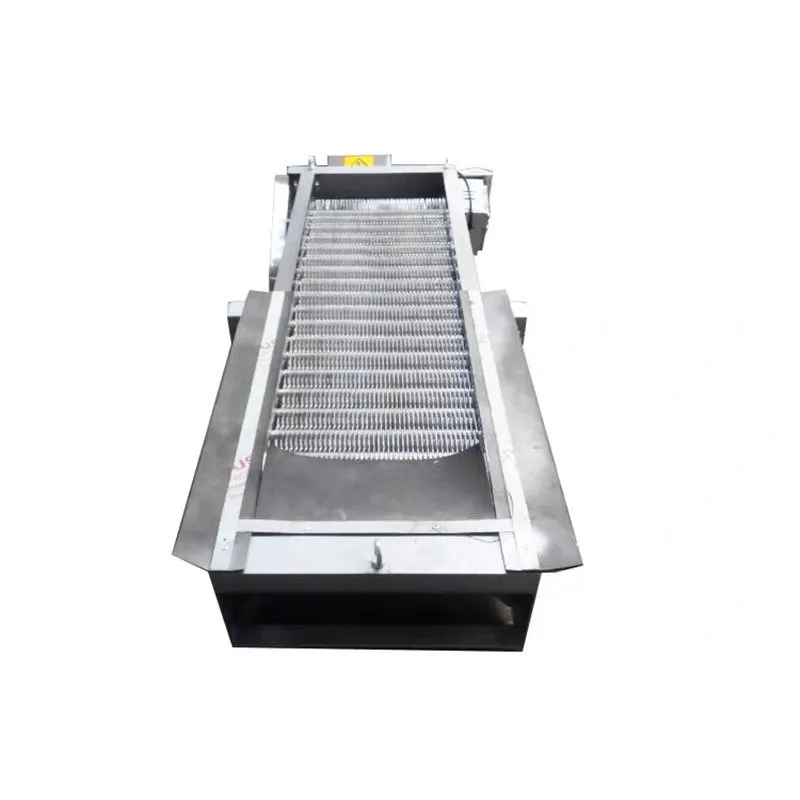Mechanical Bar Screens: Essential Tools for Water Treatment and Industrial Applications
2024-08-20
In the realm of water treatment and industrial processing, maintaining efficiency and preventing system clogging are paramount. One crucial component in achieving these goals is the mechanical bar screen. Designed to remove debris and prevent larger particles from entering water systems, mechanical bar screens play a vital role in ensuring smooth and effective operation. In this blog, we'll delve into the workings of mechanical bar screens, their benefits, applications, and recent advancements shaping this technology.
What is a Mechanical Bar Screen?
A mechanical bar screen is a type of filtration device used to remove large debris and particles from water or wastewater. It consists of a series of parallel bars or rods placed at regular intervals, creating a barrier that captures debris as water flows through it. These screens are commonly used in water treatment facilities, industrial processes, and other applications where effective filtration is required to protect downstream equipment and maintain system efficiency.
Key Features of Mechanical Bar Screens
1. Bar Configuration: Mechanical bar screens are characterized by their array of vertical or inclined bars. The spacing between these bars can vary depending on the size of debris to be filtered out. The bars are typically made from durable materials such as stainless steel to withstand harsh conditions.
2. Automatic Cleaning Mechanism: Many mechanical bar screens are equipped with an automatic cleaning system that periodically removes accumulated debris. This cleaning mechanism can include brushes, rakes, or scraping devices that ensure continuous operation without manual intervention.
3. Inlet and Outlet Channels: Mechanical bar screens are installed in channels or troughs where water flows through. The inlet channel directs the incoming water to the screen, while the outlet channel collects the filtered water or wastewater.
4. Adjustable Screen Angles: Some mechanical bar screens allow for adjustment of the screen angle to optimize debris removal and flow rates. This flexibility can enhance the effectiveness of the screening process based on specific application requirements.
5. Durability and Corrosion Resistance: Given their exposure to water and potential corrosive substances, mechanical bar screens are built from materials that are resistant to corrosion and wear. Stainless steel and other high-quality alloys are commonly used.
Benefits of Mechanical Bar Screens
1. Effective Debris Removal: Mechanical bar screens efficiently capture large debris, such as leaves, sticks, and plastic waste, preventing them from entering downstream equipment and causing blockages or damage.
2. Prevention of Clogging: By removing larger particles before they reach more sensitive components, mechanical bar screens help prevent clogging and reduce maintenance needs for pumps, valves, and other equipment.
3. Improved Water Quality: Ensuring that large debris is removed before water or wastewater treatment processes improves the overall quality of the water and enhances the effectiveness of subsequent treatment stages.
4. Reduced Operational Costs: The use of mechanical bar screens minimizes the need for manual cleaning and maintenance, leading to lower labor costs and reduced downtime. The automatic cleaning feature further contributes to operational efficiency.
5. Customization and Adaptability: Mechanical bar screens can be customized to meet specific needs, including variations in bar spacing, screen angle, and cleaning mechanisms. This adaptability makes them suitable for various applications and environments.
6. Durability and Longevity: Built to withstand harsh conditions and continuous operation, mechanical bar screens offer long-term reliability and performance, reducing the need for frequent replacements.
Applications of Mechanical Bar Screens
1. Municipal Water Treatment: Mechanical bar screens are widely used in municipal water treatment facilities to protect pumps, clarifiers, and other equipment from large debris that could cause blockages or damage.
2. Wastewater Treatment: In wastewater treatment plants, mechanical bar screens help remove large particles and solids from influent water before it undergoes further treatment processes, such as sedimentation or biological treatment.
3. Industrial Processes: Various industries, including chemical manufacturing, food processing, and paper mills, use mechanical bar screens to filter out debris and protect their systems from contamination and damage.
4. Stormwater Management: Mechanical bar screens are employed in stormwater management systems to capture debris and prevent it from entering natural water bodies or drainage systems, helping to maintain water quality.
5. Power Generation: Power plants use mechanical bar screens to protect cooling water intake systems from large debris that could affect the efficiency of heat exchangers and other critical components.
6. Mining and Aggregates: In the mining and aggregates industry, mechanical bar screens are used to separate large particles from water used in processing operations, ensuring that equipment operates smoothly and efficiently.
Future Trends and Innovations
The field of mechanical bar screens is continuously evolving, with several trends and innovations shaping its future:
1. Advanced Materials: Research into new materials and coatings is improving the durability and corrosion resistance of mechanical bar screens. Innovations such as composite materials and advanced alloys are enhancing performance and longevity.
2. Smart Technology Integration: The integration of smart technologies, including sensors and IoT (Internet of Things) capabilities, is allowing for real-time monitoring and management of mechanical bar screens. These technologies provide data on screen performance, debris accumulation, and maintenance needs.
3. Energy Efficiency: Efforts to enhance the energy efficiency of mechanical bar screens include optimizing cleaning mechanisms and reducing energy consumption during operation. Improved designs are focusing on minimizing energy use while maintaining effective debris removal.
4. Enhanced Cleaning Mechanisms: Innovations in cleaning mechanisms, such as advanced rakes, brushes, and automatic scrapers, are improving the efficiency and reliability of debris removal. These enhancements help reduce maintenance requirements and downtime.
5. Modular Designs: Modular and customizable designs are becoming more common, allowing for easy adjustments and replacements of individual components. This approach enhances flexibility and simplifies maintenance.
6. Environmental Considerations: The industry is increasingly focusing on environmentally friendly solutions, including the use of recyclable materials and waste management strategies to minimize the environmental impact of mechanical bar screens.
Conclusion
Mechanical bar screens are essential components in water and wastewater treatment, industrial processing, and various other applications. Their ability to efficiently remove debris, prevent clogging, and improve water quality makes them invaluable for maintaining system performance and reducing operational costs. As technology continues to advance, mechanical bar screens are evolving to offer even greater efficiency, durability, and adaptability. By understanding the benefits, applications, and future trends associated with mechanical bar screens, businesses and facilities can make informed decisions to enhance their operations and achieve optimal performance.



